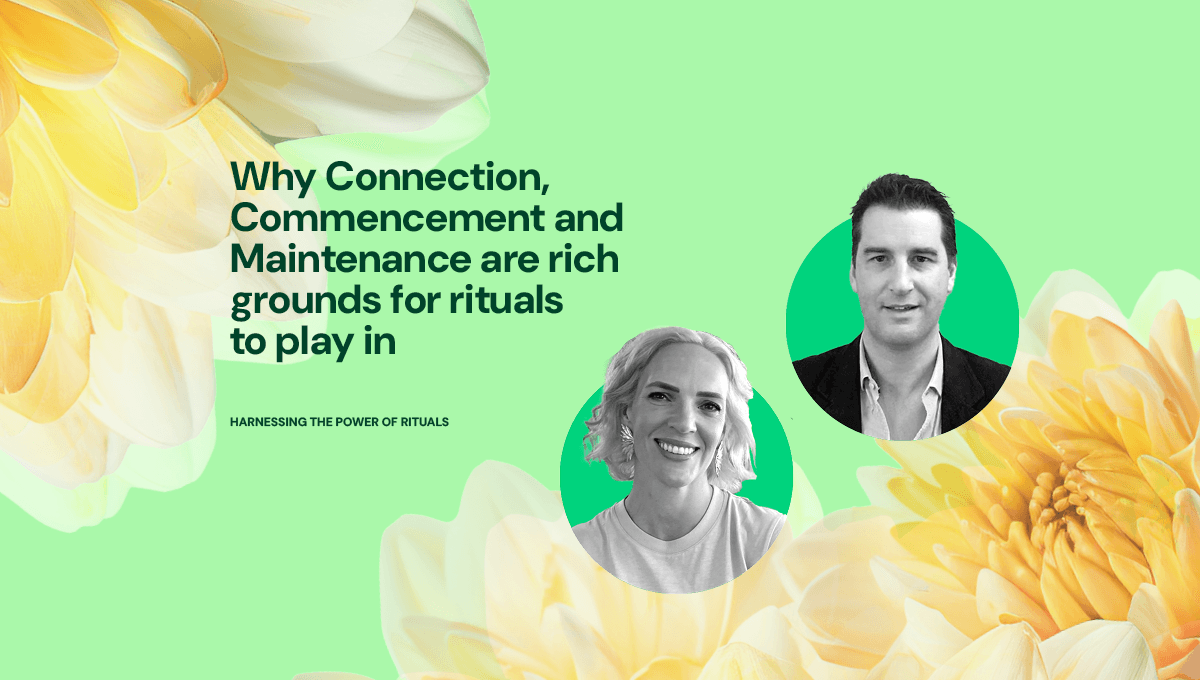 Home Page
Home PageWhy Connection, Commencement and Maintenance are rich grounds for rituals to play in

As part of our research white paper in partnership with WARC, "Harnessing the Power of Rituals", we spoke to senior marketers across the globe to uncover their own experiences and insights around rituals, and their impact on consumers and brands.
This discussion between Kit Altin, Chief Strategy Officer at The Gate London and Matt Graham, Chief Marketing Officer for Mars Global Food & Nutrition, explores the impact of routines on rituals - and why connection, commencement and maintenance are rich grounds to play in.
To download the white paper and discover more about rituals, visit Ritualized.
What are some of the macro trends and behaviours that you’re seeing within the food category at the moment?
We know consumers are looking for prepared food and meals more than ever before. We're seeing it from a retailer point of view – this convergence of grocers becoming more like restaurants with the propositions they offer around full complete solutions.
And we’re taking inspiration from our favourite restaurants and cuisines and seeing how that translates back into mainstream retail. For example, in the North American market, Chipotle's has played a significant role in building the popularity of Mexican cuisine, which has transformed the whole category. So, I think there's a whole retailer movement that's becoming a little bit more blurred between in home and out of home.
This existed pre-COVID but what’s accelerated post-COVID is the way consumers are looking for speed and convenience, and experiences around what they're consuming both from a product point of view, but equally in terms of diversity and fusion. I think social media is playing a massive role in that movement around how people are consuming and using inspiration for how they find a ‘twist’ on cuisine and certainly from a food category standpoint.
There is tension in consumers’ lives around ‘well-intentioned compromises’. They want to consume healthily, and they want to consume ‘better for you’ solutions. But also, at convenience and speed. There’s not many solutions that offer both, and I think it’s a real dilemma in society, that the most affordable meals are generally not as healthy, and the ones that offer more convenience are not as healthy either. So, we're seeing this massive innate tension that exists that certainly we are trying to break as part of our purpose and ambition as a business.
If habits or routines tend to be automated and about efficiency, and rituals are about intent and meaning, do you think that your categories lend themselves well to rituals?
In terms of habits, the top ten meals in most countries haven't changed over decades. There's twists of habits, such as pesto coming in and the resulting popularity of pesto pasta for example. But even if you look at the top Italian meals in the UK, they haven't changed for forever and a day. The US is the same.
In food, there's pockets of rituals, but not many that I'd say that have stood the test time versus say, confectionery. Obviously, you’ve got the benefit of big events and occasions like Halloween, that you could argue are etching on rituals, where people want to immerse themselves into that environment and they're prepared to spend more money, more time, more everything.
It's interesting when you talk about things not changing too much. Is it a challenge for new rituals and products to break through - even in the more innovative categories?
As humans we love routine, and we love normality. Consumers shop within a category typically across a set range of brands, and we'll switch between any one of them but there's only a finite amount of those that make it onto our repertoire and they often don't change. Even if you look in confectionery, the top 10 selling brands haven't changed for decades; and consider the enormity of that when you know how much comes in and out of the market. So, I think understanding how you can jump on emerging rituals and build that fit for your brand or the category in which you play, is the bit I’m really interested in.
And it’s about how this translates to creating value. Because the biggest challenge we've had with the purpose debate on brands is around how you translate that to true value.
Going into some of the roles that we're seeing for rituals across categories, and to pick three of them, firstly there's the fact that we're in this incredibly volatile environment that feels very out of control, and we're being exposed to more. It's not that the world is necessarily weirder or harder than say it was, in the 1500s. It's just that we see so much more of it, and we need more support and emotional well-being to cope with it.
And then we've also seen a shift where previously rituals used to be more about a collective experience or about your community and that might have been through a religious framework or a cultural one. And while that still absolutely exists, rituals now are very much more about supporting people as individuals because we're in this kind of atomized society.
And the third example is where rituals give a bit more meaning and purpose in a world that feels like it’s obsessed with efficiency and numbers.
Could you see any of your brands playing to any of those needs or roles?
I love the point of over-efficiency. Although I mentioned before the importance of creating value, I think at times we become too obsessed with return on investment, because we know that it's not just about the transaction; the brands in our consumers’ lives mean more than that. Think about a brand like M&M's, and the joy that it’s bought over generations and still does today through fun, colour and chocolate. It’s a great example of where the brand can play a role in a very serious world we live in.
Do I think the wider world is becoming obsessed with efficiency? I do, and I think there is an opportunity to create more meaning.
I think the big watch-out that could tip us over the edge is Ai, because we're doing some work at the moment to explore and learn in this space, and the amount of content you can create is brilliant, but to be honest with you, the quality is not great. As we go on that journey, we are measuring effectiveness as well as efficiency. Finance partners will want to know if we are getting more for every dollar, but the only way we're going to get more is if we're effective, right? So that's going to be a big tension for the industry as we unpack the Ai beast more and more.
Could you talk a bit more about the distinction between meaning and purpose? And do you think meaning is the better one to be focusing on right now?
I don't, and I see there’s a role for both, but not on everything we do. I think we went down a road in Mars for a while where we muddled the two up. The way I refer to both is that every brand has to have meaning in consumers’ lives because that's the anchor point around what it stands for. Snickers is a great example of that and has stood the test of time. We’ve created ‘You're not you when you're hungry’ which is such a powerful insight, and 14 years on, the platform continues. Then you go to the variation on that around Pedigree and how we help homeless dogs and shelters and how that translates through, and it's absolutely beautiful. It's exactly what we should be doing because that actually serves the direct benefit to the pet and the pet parent. There's linkages on those two extremes where we try and retrofit in the middle, brands that don't authentically deserve to play or to be honest with you, and we talk about ads, not acts. Every brand should have meaning, because it should resonate with consumers and have distinctiveness, but not every brand needs to be led through purpose, because we want to have real impact.
What we've spent a lot of time on over the last 5-10 years is establishing how we link it back to creating value because if it's not moving the needle on penetration or driving conversion or whatever it is, what's the point if it's not adding any value, right? Pedigree is a great example because it adds huge value to communities and people and pets, and we can see the direct correlation to the impact it's had on the brand as well.
It's a good moment to get into some of the types of ritual. We’ve found in the research that they're all about changing state in one way or another; even if it's something that's about security, it's taking you from feeling less safe to feeling more safe for example.
Do any stand out to you as particularly rich areas for the brands that you work with?
The first is around commencement and helping people start something in the next phase of their lives, and that area I mentioned before around well-intentioned compromises and nutrition. Certainly, in North America, but I think it exists across a lot of Western countries, it’s something that we've unpacked and we've got a brand in North America called Seeds of Change, which is a healthier version of what you'd normally buy. It’s mainstream, but it contains healthier grains and healthier legumes, and we believe that is a real catalyst for this ‘well-intentioned compromises’ space.
The other one is around connection, and linked to it is the biggest brand in our food and nutrition portfolio, which is Ben's Original. We rebranded in 2021, after Black Lives Matter from Uncle Ben's to Ben's Original, which was absolutely the right thing to do, but it was a big undertaking and as part of that work we unpacked how we could be more meaningful around equality, inclusion and diversity in the brand. We created a purpose which is that Ben’s Original has a role to play in offering everyone a seat at the table. As a result of that, it's about providing accessible, nutritious meals for the people that can't afford them, and it's about giving people equal opportunity, so we've set up a scholarship programme for African Americans in North America.
Can you see any particular rewards or perhaps more importantly, any particular risks for marketers that might want to tap into ritual behaviours?
We have to make sure that we're driving the reach of our brands, so if we're aiming for personalization, it has to be at scale. Ultimately, we can't be a niche. We can't be targeted. So, the worry I have for marketers that go into rituals without a proper understanding of them, is they go too narrow into it and a little bit one-dimensional in their approach. For me, if a brand does have a purpose or really deep meaning in some of this space where it naturally ladders up from a category point of view that’s ok, but I worry that it could get so narrow and focused that it just becomes niche.
And I wonder for Mars, what’s the commercial way of talking about rituals, so that it isn’t simply marketing fluff? If we can commercialise it then we can activate it throughout the consumer journey, and that will be the art of it.
I’m very interested in the potential of rituals, but how to operationalize it is key.
VISIT THE RITUALIZED HOMEPAGE, HERE

Further reading



